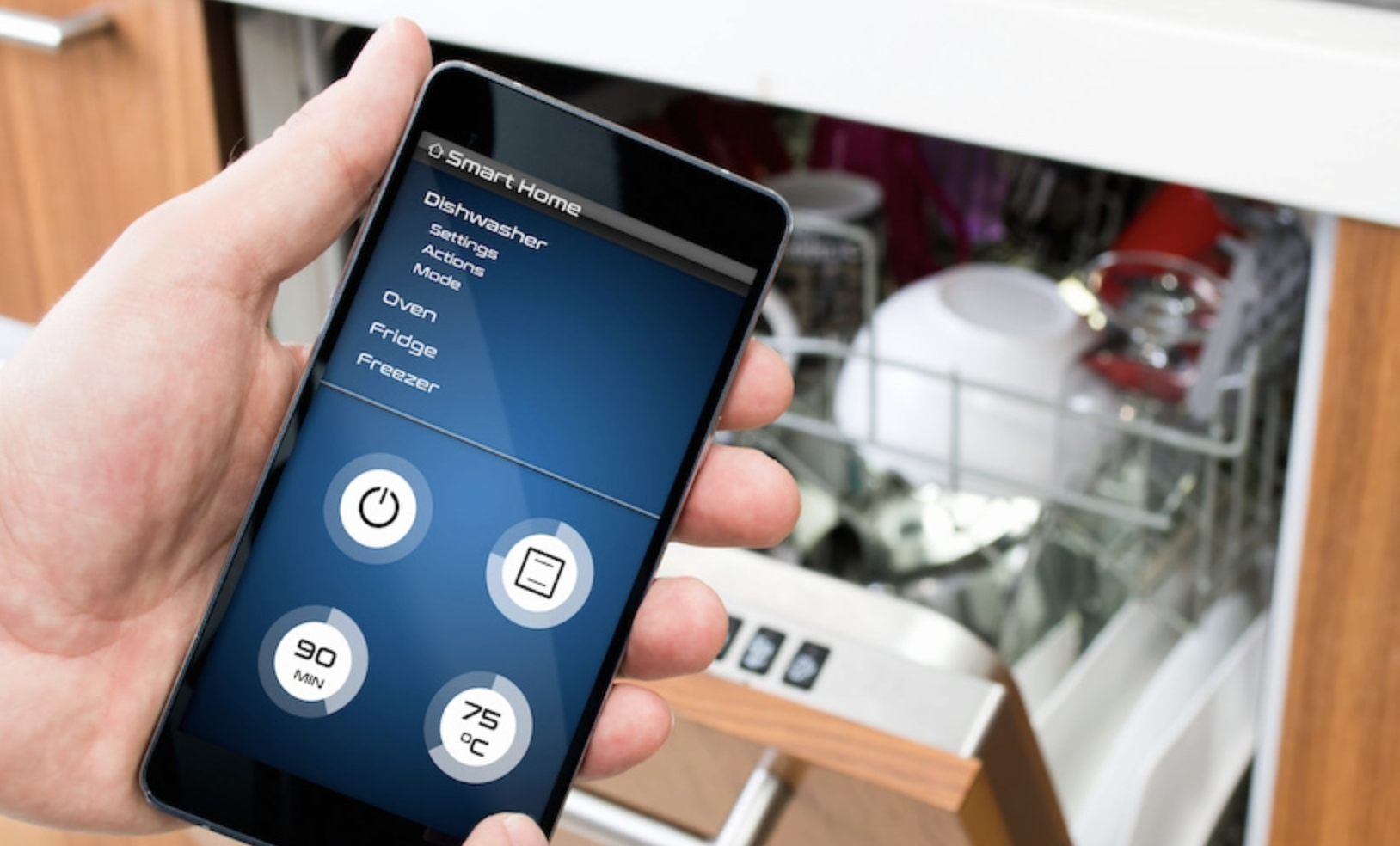The Latest High-Tech Dishwashers
Cleaning up after dinner is a chore no more thanks to smart dishwashers.
Nothing can spoil a delicious dinner like a stack of dirty dishes.
Fortunately for you, that scenario can be a thing of the past thanks to the latest in dishwasher technology.
Wi-Fi-connected, self-diagnosing, auto-air-drying, schedulable and more—today’s smart dishwashers are marvels of cleanliness and convenience.
Here are a few of our favourite clever cleansing contraptions.
LG STUDIO Smart Dishwasher

LG
Equipped with LG’s QuadWash technology—four multi-motion spray arms that provide power-cleaning sprays—the STUDIO Smart Dishwasher is a machine that you won’t have to worry about. The Wi-Fi-equipped washer is constantly self-monitoring, sending maintenance tips and usage reports to users via LG’s accompanying ThinQ app, allowing owners to keep their dishwasher running at optimal capacity. The STUDIO Smart will even send alerts for potential problems before issues arise, enabling users to proactively tackle and avoid evenings of handwashing while awaiting a handyman.
The LG STUDIO Smart Dishwasher is available for $1429
Miele G-7000

Miele
If time travellers had sent a dishwasher back to the past, it might be the Miele G-7000. This futuristic feat of German engineering offers users an innovative AutoDos system, which determines how dirty your dishes are and dispenses the perfect amount of detergent to achieve excellently clean dishes without excess cleaner. But that’s just the start of the G-7000’s intelligence. With the Miele@mobile app, G-7000 owners can auto-start their dishwasher from anywhere in the world from their phone (or via voice control with Amazon Alexa), or schedule washings so they’ll have clean dishes precisely when they need them. The G-7000 will also send an alert to owners when they are running low on detergent so they never find themselves cleaned out of cleaner.
The Miele G-7000 is available from $2049 depending on features.
Bosch Benchmark Dishwasher

Bosch
Tired of washing your dishes before you wash your dishes? Invest in the Benchmark Dishwasher from Bosch. Equipped with smart sensors that continually monitor the washing process and the cleanliness of dishware—and determine what still needs to get done—the Bosch ensures that you don’t need to rinse your dishes before you put them in the machine. Bosch’s Home Connect app will send user’s notifications when the cycle is done—but if owner’s prefer a more visual cue, the device’s InfoLight—a red dot the machine projects on the ground while it’s running—will do. The Home Connect app will also give users a heads up if a leak has occurred or if they are running low on detergent. And if you think all that technology means industrial sounds coming from your kitchen—think again.
The Bosch Benchmark is available for approx. $2500
Thermador Sapphire

Thermador
The Sapphire line of dishwashers from Thermador marries brains with beauty. Wi-Fi-equipped—and custom-panel ready so it can match your existing home decor—the Sapphire allows users to remotely control their dishwasher, run diagnostics on its health and receive notifications for cycle completion and more. And the Sapphire’s StarDry system leverages ZeoLite to ensure that every dish, regardless of material, is dry as a bone the moment the cycle is complete, negating the need for additional hand drying. All of this, and the Sapphire’s interior glows a lovely—you guessed it—sapphire when the dishwasher is open.
The Thermador Sapphire is available for around $3130
 Copyright 2020, Dow Jones & Company, Inc. All Rights Reserved Worldwide. LEARN MORE
Copyright 2020, Dow Jones & Company, Inc. All Rights Reserved Worldwide. LEARN MORE
This stylish family home combines a classic palette and finishes with a flexible floorplan
Just 55 minutes from Sydney, make this your creative getaway located in the majestic Hawkesbury region.
As Paris makes its final preparations for the Olympic games, its residents are busy with their own—packing their suitcases, confirming their reservations, and getting out of town.
Worried about the hordes of crowds and overall chaos the Olympics could bring, Parisians are fleeing the city in droves and inundating resort cities around the country. Hotels and holiday rentals in some of France’s most popular vacation destinations—from the French Riviera in the south to the beaches of Normandy in the north—say they are expecting massive crowds this year in advance of the Olympics. The games will run from July 26-Aug. 1.
“It’s already a major holiday season for us, and beyond that, we have the Olympics,” says Stéphane Personeni, general manager of the Lily of the Valley hotel in Saint Tropez. “People began booking early this year.”
Personeni’s hotel typically has no issues filling its rooms each summer—by May of each year, the luxury hotel typically finds itself completely booked out for the months of July and August. But this year, the 53-room hotel began filling up for summer reservations in February.
“We told our regular guests that everything—hotels, apartments, villas—are going to be hard to find this summer,” Personeni says. His neighbours around Saint Tropez say they’re similarly booked up.
As of March, the online marketplace Gens de Confiance (“Trusted People”), saw a 50% increase in reservations from Parisians seeking vacation rentals outside the capital during the Olympics.
Already, August is a popular vacation time for the French. With a minimum of five weeks of vacation mandated by law, many decide to take the entire month off, renting out villas in beachside destinations for longer periods.
But beyond the typical August travel, the Olympics are having a real impact, says Bertille Marchal, a spokesperson for Gens de Confiance.
“We’ve seen nearly three times more reservations for the dates of the Olympics than the following two weeks,” Marchal says. “The increase is definitely linked to the Olympic Games.”

Getty Images
According to the site, the most sought-out vacation destinations are Morbihan and Loire-Atlantique, a seaside region in the northwest; le Var, a coastal area within the southeast of France along the Côte d’Azur; and the island of Corsica in the Mediterranean.
Meanwhile, the Olympics haven’t necessarily been a boon to foreign tourism in the country. Many tourists who might have otherwise come to France are avoiding it this year in favour of other European capitals. In Paris, demand for stays at high-end hotels has collapsed, with bookings down 50% in July compared to last year, according to UMIH Prestige, which represents hotels charging at least €800 ($865) a night for rooms.
Earlier this year, high-end restaurants and concierges said the Olympics might even be an opportunity to score a hard-get-seat at the city’s fine dining.
In the Occitanie region in southwest France, the overall number of reservations this summer hasn’t changed much from last year, says Vincent Gare, president of the regional tourism committee there.
“But looking further at the numbers, we do see an increase in the clientele coming from the Paris region,” Gare told Le Figaro, noting that the increase in reservations has fallen directly on the dates of the Olympic games.
Michel Barré, a retiree living in Paris’s Le Marais neighbourhood, is one of those opting for the beach rather than the opening ceremony. In January, he booked a stay in Normandy for two weeks.
“Even though it’s a major European capital, Paris is still a small city—it’s a massive effort to host all of these events,” Barré says. “The Olympics are going to be a mess.”
More than anything, he just wants some calm after an event-filled summer in Paris, which just before the Olympics experienced the drama of a snap election called by Macron.
“It’s been a hectic summer here,” he says.

AFP via Getty Images
Parisians—Barré included—feel that the city, by over-catering to its tourists, is driving out many residents.
Parts of the Seine—usually one of the most popular summertime hangout spots —have been closed off for weeks as the city installs bleachers and Olympics signage. In certain neighbourhoods, residents will need to scan a QR code with police to access their own apartments. And from the Olympics to Sept. 8, Paris is nearly doubling the price of transit tickets from €2.15 to €4 per ride.
The city’s clear willingness to capitalise on its tourists has motivated some residents to do the same. In March, the number of active Airbnb listings in Paris reached an all-time high as hosts rushed to list their apartments. Listings grew 40% from the same time last year, according to the company.
With their regular clients taking off, Parisian restaurants and merchants are complaining that business is down.
“Are there any Parisians left in Paris?” Alaine Fontaine, president of the restaurant industry association, told the radio station Franceinfo on Sunday. “For the last three weeks, there haven’t been any here.”
Still, for all the talk of those leaving, there are plenty who have decided to stick around.
Jay Swanson, an American expat and YouTuber, can’t imagine leaving during the Olympics—he secured his tickets to see ping pong and volleyball last year. He’s also less concerned about the crowds and road closures than others, having just put together a series of videos explaining how to navigate Paris during the games.
“It’s been 100 years since the Games came to Paris; when else will we get a chance to host the world like this?” Swanson says. “So many Parisians are leaving and tourism is down, so not only will it be quiet but the only people left will be here for a party.”
This stylish family home combines a classic palette and finishes with a flexible floorplan
Just 55 minutes from Sydney, make this your creative getaway located in the majestic Hawkesbury region.






















